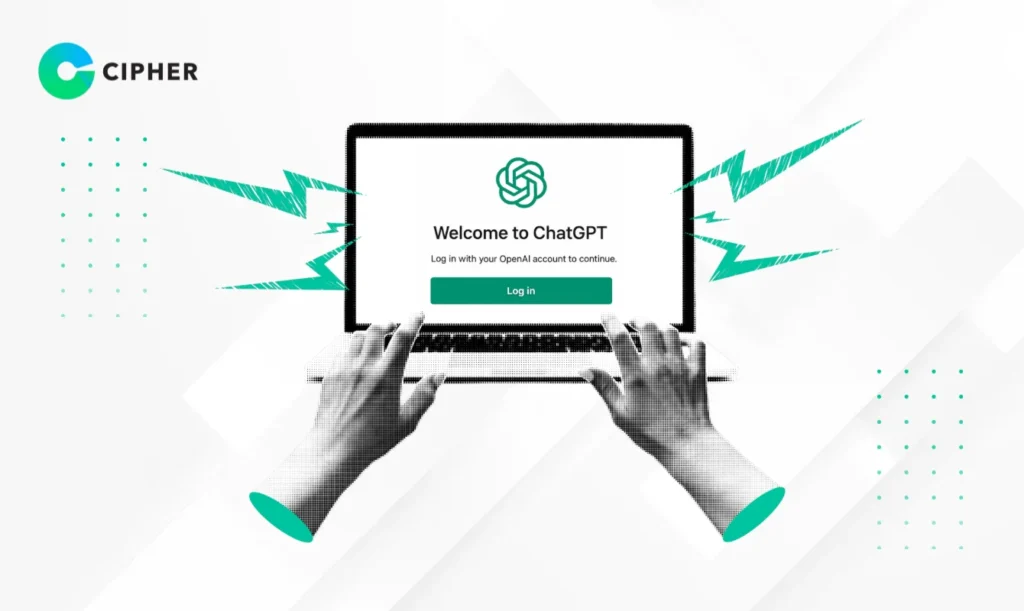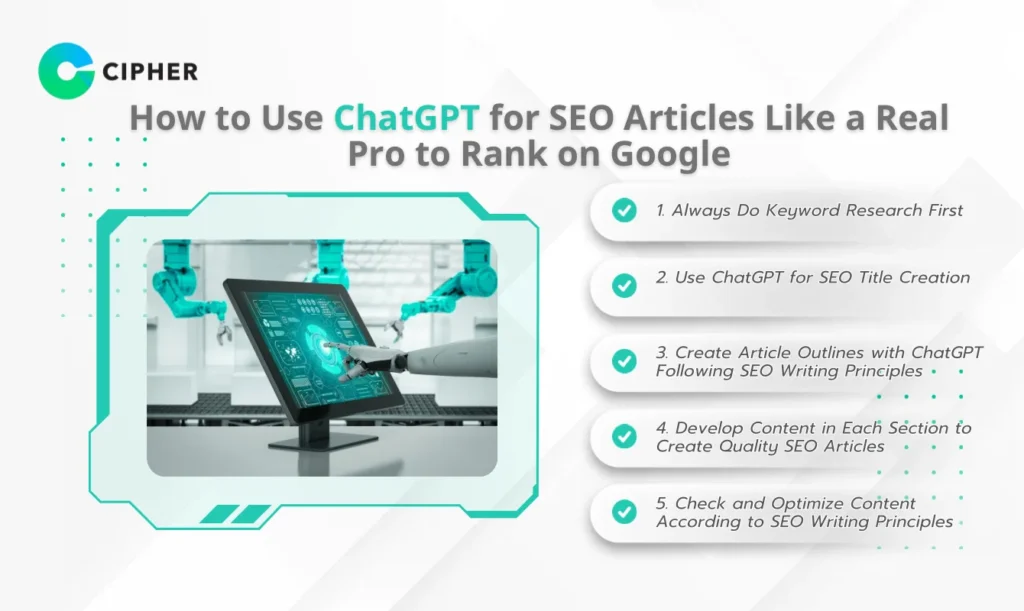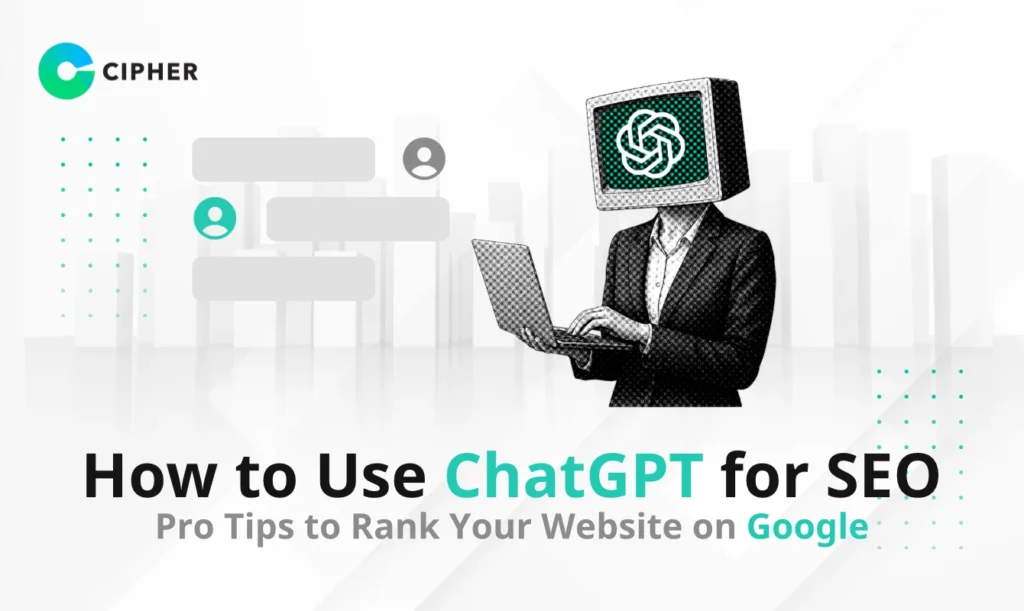There’s no denying that ChatGPT has become one of the most talked-about tools in recent times, especially in the online marketing world. But many wonder, “Can you effectively use ChatGPT for SEO?” or how it can make writing SEO articles easier. Today, we’ll answer these questions and share professional techniques for using ChatGPT for SEO to improve your Google rankings!
Table of Contents
What is ChatGPT? Why is it Popular for SEO Content Creation?

ChatGPT is an AI system developed by OpenAI that can interact with humans naturally, almost like talking to a real person. It uses GPT (Generative Pre-trained Transformer) technology that has been trained on massive amounts of data.
ChatGPT gained popularity rapidly, breaking records with 100 million users within just 2 months after launch! Currently, it’s available in both GPT-3.5 (free) and GPT-4 (paid) versions. The latest data for GPT-3.5 extends to 2021, while GPT-4 includes information up to April 2023.
Digital marketers have started to use ChatGPT for SEO writing because of its ability to create quality content, analyze keywords, and help improve Google SEO strategies, which are crucial factors in getting your website to rank on Google.
Can You Really Use ChatGPT for SEO? How Does it Help with SEO Writing?
The answer is “Yes,” but you need to use it correctly for SEO article writing!
Google has clearly stated that it doesn’t prohibit using AI to create content, as long as that content is high-quality and not spam. However, they recommend using AI as just a “helper,” not the primary tool for creating all your content.
When you use ChatGPT for SEO work, you can help your website rank on Google in several ways:
- Brainstorm interesting topics and article titles for SEO writing
- Help create quality SEO articles that rank on Google
- Suggest longtail keywords with high ranking potential
- Write Title Tags and Meta Descriptions
- Check grammar and language
- Find suitable websites for building backlinks
Who Should Use ChatGPT for SEO? Personas Who Will Benefit Most
1. Digital Marketers with Overwhelming Workloads
Characteristics: Marketers who manage multiple platforms including SEO, social media, email, and online advertising.
hallenge: Limited time to create large amounts of quality content.
How ChatGPT Helps: Accelerates brainstorming processes, helps draft initial content, and creates comprehensive content plans, saving over 40% of time.
2. Small Business Owners Wearing Multiple Hats
Characteristics: Business owners who handle management, sales, and marketing themselves.
Challenge: Lack of in-depth SEO knowledge and no budget to hire experts.
How ChatGPT Helps: Acts as a cost-effective assistant, providing basic SEO advice and helping create keyword-focused content even without prior experience.
3. Content Writers Looking to Enhance SEO Skills
Characteristics: Writers with content creation skills who want to improve their SEO knowledge.
Challenge: Writing content that is both engaging and SEO-friendly
How ChatGPT Helps: Suggests natural keyword usage, helps adjust content structure for SEO, and recommends improvements to achieve better rankings.
4. SEO Professionals Seeking Efficiency
Characteristics: Professional SEOs looking for tools to increase work efficiency
Challenge: Analyzing large amounts of data and creating complex content strategies.
How ChatGPT Helps: Assists with competitor analysis, recommends Topic Cluster structures, and quickly creates Schema Markup, allowing more time to focus on strategic work. Many in this group also use tools like Ahrefs alongside ChatGPT to maximize their SEO efforts.
5. Bloggers or Influencers Looking to Expand Their Audience
Characteristics: Online content creators wanting to increase reach through online searches.
Challenge: Consistently creating new content that matches what their target audience is searching for.
How ChatGPT Helps: Finds the latest trends, suggests popular topics, and helps update old content to be relevant for new Google rankings.
10 Pro Ways to Use ChatGPT for SEO to Get Your Website on Google's First Page (With Sample Prompts)
1. Find Long-tail Keywords with High Ranking Potential on Google
Long-tail keywords are longer and more specific search terms, which typically have less competition than general keywords, increasing your chances of ranking higher. When you use ChatGPT for SEO keyword research, you can discover valuable opportunities. Try this prompt:
“Create a table of 10 longtail keywords for [your business]. Name the first column ‘longtail keyword’ and the second column ‘Search intent’
” For example: “Create a table of 10 longtail keywords for CCTV cameras. Name the first column ‘longtail keyword’ and the second column ‘Search intent'”
2. Create Article Titles that Attract Readers and Rank on Google
Article titles are crucial for CTR (Click-Through Rate) and Google rankings. Good SEO article writing starts with an interesting title. Try these prompts:
“Help create article titles about ‘[topic]’ that attract readers’ attention and make the article look interesting. Give me 10 examples”
Or more targeted: “Suggest article titles about ‘[topic]’ that focus on providing advice to people who are not tech-savvy”
3. Power Up Your Titles with Click-Inducing Words
Power Words are terms that trigger emotions and increase the chances of people clicking on your article. When you use ChatGPT for SEO title creation, these words can significantly boost engagement. Try this prompt:
“Help think of 50 power words that encourage people to click and read articles for [business type] businesses in English”
Additionally, you can ask for words that indicate benefits customers will receive:
“Help think of 50 words that indicate ‘benefits’ customers will get in the [business type] industry”
4. Plan Content with Blog Topic Ideas and Search Intent for SEO Writing
Understanding Search Intent (the purpose behind searches) helps you create articles that meet user needs and increase your chances of ranking well on Google. Try this prompt:
“Pretend you’re a marketing expert in [industry]. Help find blog ideas about ‘[topic]’. Display results as a table with these columns: Blog Title, Search Intent, Meta Description. The Blog Title column contains the blog name. The Search Intent column contains the user’s intention when searching for information. Recommend a Meta Description for the Meta Description column. Make the content useful, concise, and engaging. Limit your output to only 10 article titles
5. Find Popular Questions About Your Business
Answering questions people frequently search about your business helps increase your chances of ranking in the “People Also Ask” section on Google. This is a powerful way to use ChatGPT for SEO content ideation. Try this prompt:
“Create 10 questions you think people want to know about ‘[your product or service]'”
6. Create Keyword Clusters for Specialized Expertise and Google Ranking
Keyword Clusters are groups of related keywords. Creating articles that cover Keyword Clusters helps Google see your website as having expertise in that area, which is an important technique in successful Google SEO. Try this prompt:
“Help create a keyword cluster about [your business or service]”
7. Create Comprehensive Content Outlines and Summaries for SEO Article Writing
Having a good content outline helps you write SEO articles that are comprehensive and on point, which is a key factor in getting your website to rank on Google. Try this prompt:
“Create a content outline for an article titled ‘[article title]'”
8. Find Internal Links to Connect Content
Linking content within your website helps Google understand your website structure and helps readers discover other interesting content. Try this prompt:
“I’m writing an article about [topic]. Can you suggest related internal links on [your website URL]?”
9. Find Knowledge Gaps to Create Unique Content
Knowledge Gaps are areas of knowledge that haven’t been widely discussed. Creating content that addresses Knowledge Gaps helps you have unique and valuable content, giving your website a better chance to rank on Google. This is a strategic way to use ChatGPT for SEO advantage. Try this prompt:
“Help find Knowledge Gaps in the [business type]
10. Find High-Quality Backlink Sources
Backlinks are links from other websites pointing to your website, which help increase credibility in Google’s eyes. Try this prompt:
“Suggest ways to find high-quality Backlinks for websites in the [business type] industry, with examples of websites where I can request Backlinks”
How to Use ChatGPT for SEO Articles Like a Real Pro to Rank on Google

1. Always Do Keyword Research First
2. Use ChatGPT for SEO Title Creation
Take the keywords you’ve found and let ChatGPT help think of titles that attract attention and include those keywords, increasing your chances of getting your website on Google, such as:
“Help create 5 interesting article titles about [keyword]”
3. Create Article Outlines with ChatGPT Following SEO Writing Principles
Have ChatGPT help create article outlines that cover important points and are suitable for Google SEO methods:
“Create a detailed article outline for ‘[article title]’ with main topics and subtopics”
4. Develop Content in Each Section to Create Quality SEO Articles
Use ChatGPT for SEO content development by writing content for each section using longtail keywords naturally:
“Write content for the ‘[subtopic]’ section in the article ‘[article title]’ with a length of about 3 paragraphs”
5. Check and Optimize Content According to SEO Writing Principles
ChatGPT SEO Extensions to Enhance Your Content Creation Workflow
Besides basic ChatGPT, you can use additional tools to improve your Google SEO methods, such as a ChatGPT SEO extension like AIPRM for ChatGPT, which is a Chrome Extension that makes using ChatGPT for SEO and SEO article writing easier.
A good ChatGPT SEO extension like AIPRM has several tools that help with SEO and SEO writing, such as:
- Topical Authority: Helps brainstorm ideas and article titles
- SEO Optimized Content Outlines: Creates content outlines suitable for SEO article writing
- Paragraph SEO: Helps create focused articles with keywords in appropriate positions
Installing a ChatGPT SEO extension like AIPRM is easy – just install the Chrome Extension, go to chat.openai.com, and log in. This is one of the most efficient ways to enhance how you use ChatGPT for SEO tasks.
Complete SEO Services Using ChatGPT for SEO Optimization
AI-Powered SEO Audit
AI-Enhanced Content Creation for SEO Article Writing
AI-Powered Keyword Research for Longtail Keywords
AI-Driven Link Building
SEO Analytics & Reporting
Conclusion
When you use ChatGPT for SEO properly, it becomes a powerful tool for your content strategy, but it must be used strategically. It should be used as an assistant in SEO article writing, not the main tool. Always check content and adjust it to be unique.
Focus on quality over quantity, verify information for accuracy, and follow Google’s Guidelines that emphasize content that provides value to readers, not just stuffing keywords. For additional functionality, consider using a ChatGPT SEO extension that aligns with your specific workflow needs.
CIPHER is ready to increase your sales by helping you use ChatGPT for SEO optimization with our team of digital marketing experts. Contact us at 081-633-3636 today!
Frequently Asked Questions
What should SEO beginners do?
How to make SEO rank on Google's first page?
- Clearly define your target audience and content focus to create content that meets their needs
- Do Keyword Research and systematically plan keyword usage on your website, using both main keywords and longtail keywords
- Arrange your website structure or Site Structure to be user-friendly and search engine-friendly, with comprehensive content planning
- Create high-quality content that provides value to readers, with sufficient depth and breadth to meet their needs
- Improve user experience on your website (Website UX) to make the site load quickly, easy to use, and mobile-friendly
What is SEO?
How are SEO and SEM different?
How to write articles that rank for SEO?
- Every article must have a clear main keyword that matches what people actually search for
- Place keywords in important positions such as headings, URL, first paragraph, and subheadings to help Google understand your content
- Distribute keywords naturally, not excessively. Use related words and synonyms to enhance understanding
- Create high-quality content, providing complete, in-depth information that answers readers’ questions. This is the key to current SEO
- Regularly update old articles and create new content to show Google that your website continues to provide up-to-date information





